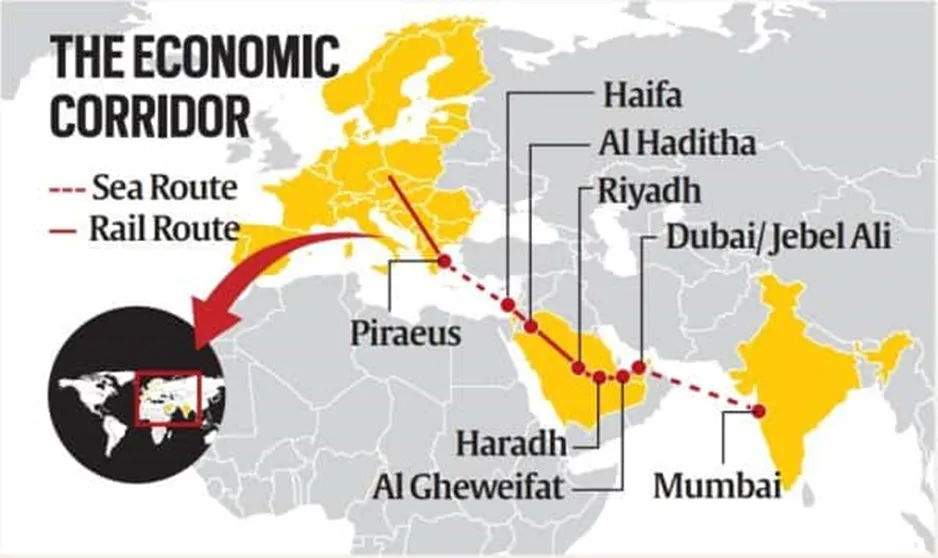Written by the UAE Independent Climate Change Accelerators (UICCA) Policy, Finance, and Advocacy Department
The global maritime industry finds itself at a critical juncture as climate challenges intensify. On September 7, 2023, the Nordic Seminar on Maritime Sustainable Practices, organized by the Ambassadors of Denmark, Sweden, Norway, and Finland in collaboration with Abu Dhabi Ports, convened industry experts and stakeholders to address these issues during a workshop in Abu Dhabi. The workshop served as a platform for exchanging experiences, innovations, and best practices, focusing on accelerating sustainability in the maritime shipping sector.
A series of keynote speeches and panel discussions covered a wide range of sustainable maritime practices, including sustainable infrastructure, alternative fuel, energy efficiency with digital technology, and government regulations.
Introducing sustainable practices in the maritime shipping sector is key for decarbonizing the trade sector in the UAE and globally.
Approximately 80% of global trade is enabled by maritime shipping which is responsible for 2.8% of annual greenhouse gas (GHG) emissions. This is primarily attributed to its reliance on carbon-intensive bunkering fuels and the extensive scale of its business operations. According to the International Renewable Energy Agency, 99% of the energy demand from the international shipping sector is met by fossil fuels.
Given the sector’s increasing trend of emissions, the decarbonization of the shipping sector is crucial for greening the overall trade sector considering the substantial portion of GHG emissions and trade volume. However, inherent challenges make it difficult to decarbonize the sector. In the midst of these complexities, the shipping industry faces significant hurdles due to the extended operational lifespans of ships, a heavy reliance on high-energy-density fuels, and the intricate web of global emissions regulatory frameworks, making it particularly resistant to efforts to reduce its environmental impact.
In the immediate future, decarbonization depends on energy-efficient design and operational measures. In light of the typical operational lifespan of maritime vessels spanning a duration of 25 to 30 years, an imperative emerges with regard to retrofitting existing vessels to accommodate low-carbon fuels. Concurrently, the development of new vessels engineered to operate on zero-carbon renewable fuels would be vital to accelerate decarbonization within the maritime industry.
The UAE has significantly advanced its maritime industry, benefitting from strategic access to major international shipping routes. This sector not only contributes to the nation’s economy but also serves as a crucial facilitator of global trade. One noteworthy example is the Emirate of Fujairah, which boasts approximately 8% of the world’s bunkering capacity, solidifying its position as a major player in the global maritime infrastructure.
The UAE has established a strategy to advance the transition of its maritime sector to hydrogen-derived energy, which aligns with the Global Ports Hydrogen Coalition and the nation’s commitment to achieving net-zero carbon emissions by 2050. Most recently, the UAE Ministry of Energy and Infrastructure (MOEI) in partnership with DNV, an international accredited registrar and classification society, launched the UAE Maritime Decarbonization Center in July 2023, which aims to establish a centralized control hub for monitoring CO2 emissions within the maritime industry.
The UAE’s maritime industry is experiencing rapid growth. During the recent G20 Summit, US President Joe Biden and US allies unveiled plans for an international rail and shipping corridor connecting India with the UAE, Saudi Arabia, Jordan, Israel, and Europe. As this initiative takes shape, the UAE’s historical role as a strategic trading hub at the crossroads of Europe, Asia, and Africa is set to become even more pivotal in the global trade network. Therefore, it is imperative for the nation to embrace sustainable practices in both its infrastructure and operations to facilitate the decarbonization of the maritime shipping sector.
Source: Sasi (2023; as cited in Tanchum, 2021)
The UICCA’s Finance, Policy, and Advocacy department aimed to gather valuable insights and best practices from the sustainable maritime shipping sector in the Nordic region. These insights serve as a benchmark not only for the UAE but also for broader applications beyond its borders.
Key takeaways
1. A critical role of energy transition in sustainable maritime shipping
During the discussions, Nordic representatives and industry experts examined a range of alternative fuels. This included an exploration of challenges related to infrastructure availability and adaptability, as well as the best practices associated with deploying alternative fuels and fully electric vessels powered by renewable energy and battery technologies.
- A representative from Maersk highlighted a significant increase in e-methanol ships powered by a combination of captured CO2 and green hydrogen, which have risen from none in 2020 to 120 today. Their first e-methanol ship was launched on September 14.
- The event showcased initiatives to retrofit existing vessels and develop new ones utilizing alternative fuel options like methanol, ammonia, and hydrogen. For example, a Norwegian representative expressed their commitment to hydrogen-driven cargo ships.
- Additionally, there is a growing interest in electrifying fleets and designing energy-efficient ships. The Nordic countries are actively exploring offshore wind sources due to their abundant availability in the region.
- Given the UAE’s status as the world’s second-largest bunkering infrastructure, it is crucial to adapt infrastructure for storing and refueling alternative fuel ships. Furthermore, in line with the UAE’s Hydrogen Leadership Roadmap, the nation has the potential to become a major hub for hydrogen-fueled vessels.
- The UAE faces the imperative of crafting a comprehensive maritime decarbonization strategy. This strategy should consider the prospective supply of alternative fuels and align with national energy transition plans. Strategic planning for sustainability should be tailored considering factors such as vessel size, shipping purpose, and distance.
2. Achieving the Systematic Transformation for a more Sustainable Maritime Shipping sector requires more than a Single Technological Solution.
- Sustainable practices encompass not only the development and utilization of alternative fuels but also innovations in the systems for fuel filling and storage for these alternatives, as well as a workforce equipped with the skills needed for effective sustainability practices.
- Such a transformation needs a comprehensive approach that considers the entire value chain, recognizes the complex interconnections among sectors (e.g., energy, mining, technology), and ensures compatibility among vessels, systems, and underlying infrastructure.
- Initiatives like the goal to double sustainable mining by 2045 and the expansion of green battery manufacturing facilities, as exemplified by a representative from Sweden, highlight the importance of a holistic approach and cross-sectoral collaboration.
- Furthermore, embracing the concept of a circular economy is essential. This involves not only sustainably sourcing materials but also ensuring the circularity of materials throughout the entire lifecycle of vessels.
3. The pivotal role of Digital Solutions, notably Artificial Intelligence (AI) and Blockchain in enhancing both Energy Efficiency and Transparency.
- Experts presented a range of digital strategies focused on curtailing energy consumption. They highlighted emerging technologies like AI and blockchain as contributors to emission reduction by optimizing vessel routes through data collection and monitoring fuel consumption trends.
- For instance, the creation of digital twins within the Metaverse framework has proven to reduce emissions by around 8%. This reduction is attributed to predictive maintenance capabilities facilitated by digital twin technology and its capacity to manage holistic supply chain data.
- The UAE, guided by the Minister of State for AI, Digital Economy, and Remote Work Applications Office (MADR), has set a robust vision for widespread adoption of digital, AI, and blockchain technologies, For the effective integration of advanced automation processes within the UAE’s maritime vessels and ports, close collaboration between the Ministry of Transportation and the MADR is essential. Such collaboration holds the potential for significant gains in operational efficiency and sustainability within the maritime sector.
4. Government Regulations and Collaborations through Public-Private Partnerships as Catalysts for Sustainable Practices.
- The establishment and implementation of regulatory frameworks that promote sustainable fuels and technologies are pivotal in achieving sustainability goals. These regulations align with the government’s overarching commitment to achieving a net-zero economy.
- In tandem with government mandates, it becomes critical for investors and corporations to closely collaborate for adopting and integrating emerging technologies within the sustainable maritime shipping sector.
- Ola Pihlblad, the Sweden Deputy Head of Mission, emphasized the inherent link between sustainability and profitability. Alfa Laval echoed this sentiment, asserting that a sustainable business is inherently profitable. This underscores the idea that adopting sustainable practices is not only ethically and environmentally responsible but also a strategic choice for business growth. H.E. Anders Bjorn Hansen, Danish Ambassador to the UAE, highlighted, “Sustainability is a good business and good business is sustainable.”
- To promote green maritime shipping and support the principles of a green economy, it is recommended that the UAE government, known for its robust commitment to sustainability, reevaluates existing incentive mechanisms for both traditional and alternative fuels. This reassessment should focus on refining these mechanisms to provide clear market signals that encourage the adoption of sustainable maritime practices.
What’s on the Horizon?
The Nordic maritime shipping workshop exemplified the importance of international collaboration and partnership, which are crucial given the inherently global nature of challenges faced by the maritime sector. By embracing international best practices related to the adoption of sustainable principles in the industry, the UAE can pave the way for a more sustainable future for the broader transportation sector.
In carbon-intensive and hard-to-abate industries like shipping, the process of reducing emissions is intricate and involves various stakeholders, making it more challenging than in other sectors. Implementing innovative technologies and policy measures to effectively reduce GHG emissions is crucial for transitioning towards a low-carbon future. The transition will be gradual, considering both socio-economic and environmental impacts. As we journey toward achieving net-zero emissions, it is imperative to explore all available strategies and options, including avoidance, reduction, restoration, and compensation/offsetting. A particular emphasis should be placed on harnessing the potential of carbon credits, and last but not least: taking immediate actions to address this pressing issue.






